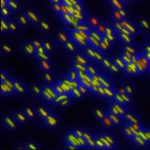Lien vers Pubmed [PMID] – 32782432
Lien DOI – 10.1177/1178636120945304
Microbiol Insights 2020 ; 13(): 1178636120945304
The lengthy tuberculosis therapy is emblematic of how hard drug-persistent infections are to eradicate. Phenotypic variation within clonal bacterial communities contributes to drug evasion and has major implications for the treatment of drug-persistent infections. We reported that single mycobacterial cells exhibit differential drug susceptibility, contingent on their inherent phenotypic variation in DNA damage response. Individual cells experiencing severe DNA damage massively induce the SOS response and exhibit signs of programmed cell death (PCD), such as unbalanced growth, chromosomal fragmentation, autolysis, and release of the intracellular content. Toxin-antitoxin systems are known to contribute to PCD in model microorganisms by targeting essential cellular processes, and they might function similarly in mycobacteria. We have found that the toxin MazF and a Clp protease, possibly responsible for degrading the MazF cognate antitoxin MazE, are induced during harsh conditions in a model organism for tuberculosis, and that cells that are about to lyse from drug exposure display a buildup of toxin. Deeper analysis of PCD in mycobacteria may reveal whether this process belongs to a broader strategy for the community’s survival. Finally, disrupting the balance between survival and PCD may prove useful to tackle drug evasion in mycobacterial persistent subpopulations.

